|
|
|
Sort Order |
|
|
|
Items / Page
|
|
|
|
|
|
|
| Srl | Item |
| 1 |
ID:
167376
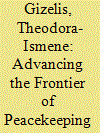

|
|
|
|
|
| Summary/Abstract |
The impact of United Nations (UN) peacekeeping on conflict has received a sustained amount of attention in the empirical literature. The advent of new data on UN peacekeeping and new temporal units of analysis have enabled researchers to expand the frontiers of peacekeeping research and undertake a more nuanced examination of peacekeeping effectiveness. In this special section, a series of articles examine how UN peacekeeping affects different types of violence within conflicts and leads to different types of peaceful outcomes. Factors such as the cultural affinity between peacekeepers and local communities, the size of peacekeeping operations and the specific composition of UN forces are shown to be important variables associated with lower levels of casualties and violence and also a higher likelihood of mediation and timely peaceful settlements in civil wars. In the aggregate, these articles suggest that robust peacekeeping is associated with better outcomes in many stages of conflict.
|
|
|
|
|
|
|
|
|
|
|
|
|
|
|
|
| 2 |
ID:
167381
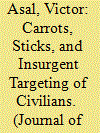

|
|
|
|
|
| Summary/Abstract |
How do conciliatory and coercive counterinsurgency tactics affect militant group violence against civilians? Scholars of civil war increasingly seek to understand intentional civilian targeting, often referred to as terrorism. Extant research emphasizes group weakness, or general state attributes such as regime type. We focus on terrorism as violent communication and as a response to government actions. State tactics toward groups, carrots and sticks, should be important for explaining insurgent terror. We test the argument using new data on terrorism by insurgent groups, with many time-varying variables, covering 1998 through 2012. Results suggest government coercion against a group is associated with subsequent terrorism by that group. However, this is only the case for larger insurgent groups, which raises questions about the notion of terrorism as a weapon of the weak. Carrots are often negatively related to group terrorism. Other factors associated with insurgent terrorism include holding territory, ethnic motivation, and social service provision.
|
|
|
|
|
|
|
|
|
|
|
|
|
|
|
|
| 3 |
ID:
167377
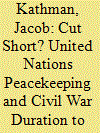

|
|
|
|
|
| Summary/Abstract |
While much literature on peacekeeping seeks to determine the effect of United Nations (UN) intervention on post-conflict peace processes, most peacekeeping operations (PKOs) are deployed to active conflicts. The limited research on peacekeeping in active civil conflicts suggests that robust PKOs reduce hostilities. Yet, if PKOs serve to extend conflict duration, even lowered hostilities can yield greater destruction over time. We thus explore the effect of peacekeeping on conflict duration. We argue that PKOs with larger troop deployments are better able to increase the cost of combat, improve information sharing between belligerents, and provide security guarantees, thus reducing the time to negotiated resolutions. Using fine-grained data on monthly peacekeeping personnel commitments and observations of ongoing conflict between combatants, we examine how variations in mission deployments affect the success of UN peacekeeping in ending civil conflicts. As expected, our findings indicate that larger troop deployments shorten war duration to negotiated resolution.
|
|
|
|
|
|
|
|
|
|
|
|
|
|
|
|
| 4 |
ID:
167380
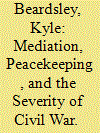

|
|
|
|
|
| Summary/Abstract |
One of the proposed benefits of third-party involvement that has been offered to justify its use is that it helps reduce the severity of conflict. Existing work finding that peacekeeping operations reduce battle-related fatalities considers peacekeeping in isolation from other forms of third-party diplomatic involvement, such as mediation. We argue that mediation has its own effect on patterns of violence. Moreover, we argue that peacekeeping and mediation can have an interactive effect, in which each enhance the violence-reducing potential of the other. Using monthly data on battle-related deaths in African intrastate conflicts, we find that mediation is associated with reduced bloodshed. We also find, consistent with existing work, that a greater number of peacekeepers leads to a reduction in violence. In addition, we find that mediation and peacekeeping efforts reinforce one another, although each type of involvement is able to reduce battlefield fatalities independently.
|
|
|
|
|
|
|
|
|
|
|
|
|
|
|
|
| 5 |
ID:
167382
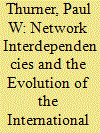

|
|
|
|
|
| Summary/Abstract |
Since few states are able to produce all of their own military hardware, a majority of countries’ military systems rely on weapon imports. The structure of the international defense technology exchange network remains an important puzzle to understand, along with the factors that drive its evolution. Drawing on a political economy model of arms supply, we propose a new network-oriented explanation for the worldwide transactions of major conventional weapons in the period after World War II. Using temporal exponential random graph models, our dynamic approach illustrates how network dependencies and the relative weighting of economic versus security considerations vary over time. One of our major results is to demonstrate how security considerations started regaining importance over economic ones after 2001. Additionally, our model exhibits strong out-of-sample predictive performance, with network dependencies contributing to model improvement especially after the Cold War.
|
|
|
|
|
|
|
|
|
|
|
|
|
|
|
|
| 6 |
ID:
167378
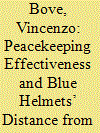

|
|
|
|
|
| Summary/Abstract |
United Nations (UN) peacekeeping missions are complex social organizations, with soldiers coming from several countries. In this environment, effective communication and interactions with local populations are often difficult, and establishing essential local support can be jeopardized when soldiers are culturally distant from local communities. At the same time, however, when local populations perceive peacekeepers as sufficiently distant or unbiased, the promotion of cooperation is enhanced. We explore whether cultural distance—in terms of geography, language, and religion—and social distance—in terms of economy and institutions—between the peacekeepers and the local population improve the operational capabilities of a mission. We use monthly information on UN peacekeeping missions’ composition from 1990 to 2015. We find that higher geographic and cultural distances correspond to higher levels of violence against civilians and higher battle deaths, whereas institutional and economic differences have the opposite effects, although these are less robust.
|
|
|
|
|
|
|
|
|
|
|
|
|
|
|
|
| 7 |
ID:
167379


|
|
|
|
|
| Summary/Abstract |
Recent years have seen an increased emphasis on both protection of civilians and the problem of sexual violence. We explore the impact of United Nations (UN) peacekeeping on the occurrence of wartime sexual violence. Acknowledging the difficulty in reducing sexual violence, we propose two conditions under which peacekeepers are more likely to be successful: when the mission has a protection mandate and when the conflict actors exercise a high level of control over their forces. We find that the ability of peacekeepers to reduce sexual violence in general is weak. Only police within protection missions reduces the risk of sexual violence by rebels. However, when the actors exercise control, the number of peacekeepers is associated with a lower risk of sexual violence by both governments and rebels. We conclude that dealing with sexual violence by weak and fragmented actors is a challenging task beyond the current capacity of UN peacekeeping.
|
|
|
|
|
|
|
|
|
|
|
|
|
|
|
|
| 8 |
ID:
167383
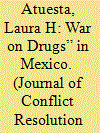

|
|
|
|
|
| Summary/Abstract |
The objective of this text is to describe the three categories that the Drug Policy Program at the Center for Teaching and Research in Economics (CIDE-PPD) database comprises, their limitations, and their main features. Additionally, we explain what we believe to be the source of the database we originally received and analyze its accuracy by comparing it with public records. We describe the validation and codification processes the database was subjected to, as well as the main biases and limitations the database may have. Additionally, we offer a preliminary analysis of the type of research that the CIDE-PPD Database can support. This analysis is not only relevant to those interested in studying the “war on drugs” in Mexico but also to those studying conflict in other countries involved in illegal drug production and trafficking, as well as countries experiencing conflicts related to organized crime.
|
|
|
|
|
|
|
|
|
|
|
|
|
|
|
|
|
|
|
|
|